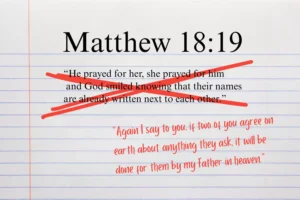Before you go any further in reading this article, which you probably think is about prayer and how to do it, you have to hear my confession. Are you ready? Here it is: I do not know how to pray. I’m writing out of what I don’t know, not out of what I do know.
I’ve learned some things about prayer from wise people and good books, so anything useful I have to say about it comes from them and not me. The fact that I have learned this stuff and still don’t know how to pray makes my struggle that much worse. Maybe some of you know what that’s like, trying to do something without knowing how to do it. When it comes to prayer, all I am is one beggar telling another where to find bread. I myself don’t have any bread to offer.
Part of my problem is that I don’t understand what prayer is or does. This is intolerable to me. I can never make heads or tails of progress in anything unless I have some intellectual grasp of how it works.
I was hopeless in learning how to drive my dad’s stick-shift until he gave me a detailed mechanical explanation of what exactly was happening in the engine when I punched in the clutch and lurched my way into first gear. After that, everything was easy. But what of prayer? I always need to ask, what does it do? How does it work? As far as I can tell, there are basically two theories about the matter.
Theory 1
The first theory is that prayer moves and changes God. Our loving Father in heaven hears our pleas, takes pity on us, considers whether or not our petitions are worthy, and then grants a response, sometimes yes and sometimes no. There’s something inherently suspicious about this theory to me. God already knows our desires, even plants many of our desires in us, gives voice to them and uses them to draw us to Him, so our prayers aren’t exactly surprises to the Lord Most High. There’s something suspicious about God changing His mind on account of our opinions — maybe for His own reasons, like in the reports of God’s repentance in the Old Testament, but not because we think He should. So there goes that theory.
Theory 2
The other theory is that we pray because it changes us. In our conversations with the divine we learn new things about ourselves, conform our will to His, alter the very things we ask for, and in so doing God’s will is enacted in us. I think this is kind of suspicious, too. There are lots of ways we get changed in life, for the worse and for the better as well, and if we’re looking for plain hard results we could probably do better than prayer, especially when you consider how much prayer is last-resort. For that matter, what we bring to the prayer in the first place often contains the seeds of our transformation already, so some fruitful self-reflection or quiet meditation could probably accomplish the same thing.
There is a problem, of course, in the way I frame the question at all. What it cares about is my part in prayer and how close I can get to having a magical genie named God who grants me three wishes a day. Both ways of looking at it are pretty selfish. Prayer benefits me; therefore, I’ll do it. Whether petition or praise, the real benefactor is myself as I learn to lower my expectations to meet a God who I don’t expect will do what I’m asking for anyway. It overestimates me and underestimates Him.
Much as I hate to concede the point, a mechanical-intellectual approach to prayer just isn’t going to work, so I’ll have to give it up. At this point, the most intellectually unaccountable thing is that I keep on praying anyway.
A Habit
A cynic might say that this is just force of habit. Prayers have been part of the framework of the day and week ever since I can remember. My mom and dad had us say grace before every meal in the words that, I’d guess, 95 percent of all Lutheran households use in some form or another: “Come Lord Jesus, be our guest, and let thy gifts to us be blessed, amen.” (Short and to the point, with little chance for the drifting smell of Sunday pot roast to get in the way of holy thoughts.) And then there were bedtime prayers, a round of “God bless”es in which every human being I could think of on planet Earth — and not a few dogs and imaginary friends — were handed over to God’s care.
Naturally, we also said the famous children’s prayer “Now I lay me” that dates back to the 12th century or so. At the age of 10, I was already getting frustrated with prayer and felt compelled to change “I pray the Lord my soul to take” to “I pray the Lord my self to take,” because “soul,” I thought, did not do justice to the resurrection of the body. This may have been a sign that a theologian was in the making or maybe just insufferable arrogance. Either way, the point is that a day without table prayers and bedtime prayers made no more sense to me than a day without food or sleep.
However, the comparison begs a very serious question. You can’t survive a day without food or sleep very happily, and many days in a row of no food or sleep are going to lead to physical and mental breakdown, and when you move into weeks of deprivation, death is sure to follow. Can’t one survive a day or a week or even a month without prayer? A whole lifetime even? Presumably, plenty of functional people manage without.
A Reflex
The dilemma was driven home to me by an anecdote my mom told me. When she was herself a little kid baffled by the purpose of prayer, she wondered if she could not say a very serious once-and-for-all kind of prayer. In it, she would put herself into God’s safekeeping and love for her whole life, ask that she would always be provided for, and promise to love Him always — but then afterwards never ever pray again. If she really meant it, and had set herself up for life, what would be the point of continual harassment at the throne of God? It seemed an insoluble problem until my dad pointed out how much I would dislike it if he took the same approach with me: one final and everlasting “I love you,” never to be repeated but always to be believed. I didn’t like that idea very much, and I could easily extrapolate to God’s own displeasure if we did the same.
At this point I can begin to see some correctives to my misguided way of thinking about prayer. The first and most obvious thing is that prayer, when it really is prayer and not whining at the sky, is not about accomplishing something. It doesn’t matter whether the “goal” is to have a request granted or to turn into a more spiritual person by virtue of hard work at prayer. Either motivation is misplaced, bound to fail, and me-centered. Prayer happens because a soul loves God and can’t keep quiet about it. Prayer happens because a soul loves God and can’t keep quiet about it. I think it’s that simple. Or: prayer happens because a soul is angry at God and can’t keep quiet about it. (Take a look at those psalms of lament!) Or: prayer happens because a soul is sorrowful without God and can’t keep quiet about it.
In each case, prayer happens. It’s not a plan or a program. It’s more like a reflex or a reaction. Whether the prayer is spontaneously composed or read out of a devotional book, it starts in the desire of the soul. We all know that you can’t just talk someone into believing in God, and I suspect you can’t talk someone into talking to God either. It has to start somewhere deep, in joy or in pain, and — this is the critical part — because of the presence and action of the Holy Spirit.
A Discipline
The great thing about the Holy Spirit here is that He upsets the categories of motivation and accomplishment to make everything point away from self and back to God. The Holy Spirit responds to the desire of a heart longing for God, but He also creates in the first place a heart that can long for God. Desires get turned into disciplines, and disciplines hold steady even as desire comes and goes. That’s why the whole history of the church has testified that a discipline of prayer is a good way to express and teach the undisciplined desire of the soul.
There is no end to the kinds and styles of prayer disciplines. Roman Catholics pray the rosary, of course, and the Orthodox say the Jesus Prayer, and the Lord’s Prayer is the final measuring stick for any kind of prayer at all. There are two particular kinds of prayer that I’ve run across lately that fit this model of disciplined desire very nicely: Lectio Divina and contemplative prayer. They are neither hard nor easy, because that implies measuring progress up to some state of perfection. Instead, they are ways of directing the desire of the soul to God.
Lectio Divina
Lectio Divina is holy reading. Usually, we read for information or entertainment. This is neither. It’s reading for illumination or devotion. It’s why you keep reading the Bible after you know already what it says, in terms of content. The words form and shape you and the way you think and believe, so you keep going back to them for more shaping and forming.
In this kind of prayer, for instance, you might take the hymn to love in 1 Corinthians 13 and spend half an hour with it. You can get the gist of the argument in 30 seconds, but in the practice of Lectio Divina you turn all your attention to the words and their meaning and soak it up, sort of the way you tan on a sunny day just from being outside whether or not you’re trying. Your thoughts and praises and requests are all shaped by the words before you. The words are teaching you how to pray, instead of making you come up with something on your own.
Contemplative Prayer
Contemplative prayer is a form of prayer without words or thoughts — not something that comes naturally to any of us. Thomas Keating, in the appendix to his book Centering Prayer, says that it is “the opening of mind and heart — our whole being — to God, the Ultimate Mystery, beyond thoughts, words and emotions. We open our awareness to God whom we know by faith is within us, closer than breathing, closer than thinking, closer than choosing — closer than consciousness itself.”
He suggests you start in a quiet and comfortable place so that you are minimally aware of your own body. Then you choose a word — Lord, Jesus, Mercy, Shalom, Amen — and make that the central point of your prayer. For 20 minutes (the recommended period of time) and with eyes shut, you gently open yourself up to God, not by analyzing or reciting the word you’ve chosen, but by using it to hush the extraneous thoughts that come creeping in. Such thoughts are inevitable and not an indication of failure. The point is that every time an outside thought comes in, you’re given another opportunity to lay it aside and turn back to God again. In that sense, it’s a microcosm of the whole life of faith.
Learning Process
I’m trying these things, and I still don’t really know how to pray. Sometimes I think the whole point of life on this earth is to learn prayer or to be taught prayer, because our eternal lives will be eternal prayer, always turned to God and in communion with Him. Weakness and failure at prayer, for now, isn’t such a bad thing. Even St. Paul thought so. “The Spirit helps us in our weakness; for we do not know how to pray as we ought, but that very Spirit intercedes with sighs too deep for words” (Romans 8:26).
In a way, it doesn’t matter that I don’t know how to pray, because God does all the praying for me. So, Lord, remember me in Your kingdom and teach me to pray.
Copyright 2001 Sarah Hinlicky. All rights reserved.










